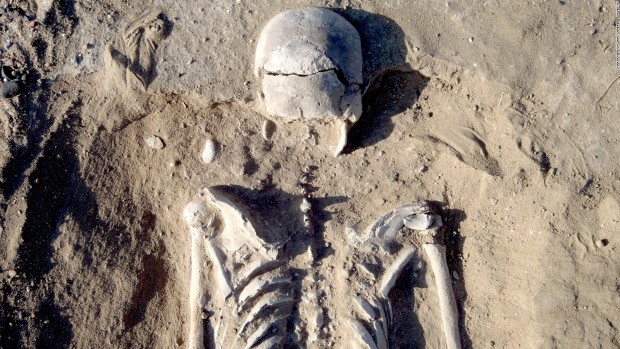Man has been at war since longer than we imagined

CNN
Nairobi, Kenya – In the same deserts where the oldest human fossils were unearthed, scientists now have discovered evidence of mankind’s worst invention: warfare. And it appears that man has been at war for longer than previously thought.
At a site in northern Kenya near Lake Turkana, archeologists found 27 bodies they believe were victims of a brutal massacre that took place more than 10,000 years ago. Among the remains were 21 adults — eight females, eight males and five whose sex couldn’t be determined — and the partial remains of six children.
“No children were found with or near any of the men. All except one of the juvenile remains are children under the age of 6; the exception is a teenager, aged 12-15 years dentally, but whose bones are noticeably small for their age,” the authors of the study wrote.
Scientists first unearthed the site in 2012, and their findings have now been published in a study spearheaded by Cambridge University and the Turkana Basin Institute.
Researchers say the discovery at Nataruk is likely the oldest evidence of human warfare.
The wounds on the bodies were severe.
The skull of one man had a “bladelet of obsidian volcanic rock” embedded in it. At least five of the dead had suffered from “blunt-force trauma to the head.” A woman’s body was found with the hands and feet bound. She was more than six months pregnant.
Also discovered were the weapons used in this blitz attack, including clubs, stone blades and arrows. The massacre happened on the banks of a lagoon, and some of the bodies fell into the water, helping to preserve them.
The victims were left to die where they lay, the study said, “with no evidence of deliberate burial.”
Discovery challenges theories of war
While there are different theories as to what led to war throughout evolution, most scientists believed that battles arose with human settlement.
“The underlying theory is that one group wants what the other group has, power, land — two groups competing for the same thing,” said University of Cambridge paleoanthropologist Dr. Marta Mirazon Lahr.
But the remains discovered in northern Kenya were those of hunter-gatherers.
“Our discovery is particularly interesting because it is a conflict, an intentional conflict, among a group of hunter-gatherers that in theory did not have ownership or possession of things that would lend themselves to such attacks.”
How to submit an Op-Ed: Libyan Express accepts opinion articles on a wide range of topics. Submissions may be sent to oped@libyanexpress.com. Please include ‘Op-Ed’ in the subject line.
- Libya’s HCS invites applicants for key state roles - December 31, 2023
- UK calls on Iran to prevent escalation in Israel-Hamas conflict - November 05, 2023
- Libyan Interior Minister: Immigrant shelter costs a fortune - November 05, 2023


